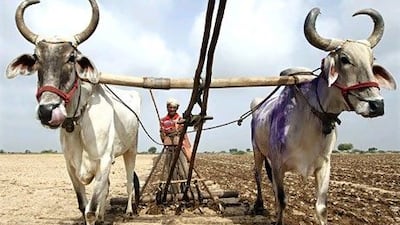India's economic prospects this year are turning increasingly gloomy with a number of circumstances compounding the woe.
A lack of government action and policies hampering the investment climate are the factors that need to be most urgently addressed, analysts say.
"Policy is the most sticky issue," says Vidya Mahambare, the principal economist at Crisil, a ratings and research company in India. He cites such matters as unclear tax regulations and backtracking on a move to open up the retail market to 51 per cent foreign investment from multi-brand chains, which have deterred foreign investors.
Deficient rainfall during the monsoon season has had a negative effect on the agricultural sector, as well as the outlook for inflation and this in turn has had an impact on other sectors, Ms Mahambare says. "Trade and transport slow down because of agriculture performing badly."
A slew of slashed GDP growth forecasts for India has emerged this month. Among them, Moody's Analytics has cut its growth forecast to 5.5 per cent for this year, while Citi has pared its projection to 5.4 per cent for the financial year ending next March.
"The stars just don't seem to be aligning for India with almost all the growth drivers being hit," said Rohini Malkani, an economist at Citi in India in a recent report.
"Drought fears are coming true; politics and policies are still not conducive for investments; power outages are taking their toll on growth; confidence is low and consumption has begun to splutter; and exports are more sensitive to global demand than the weaker Indian rupee.
"We believe the government needs to get down to serious business with more action to stem a further deceleration in growth."
A more negative outlook for the euro zone is another factor for the downward revisions of the country's growth prospects, analysts say. India's IT, software and textiles industries are heavily dependent on sales to Europe.
Exports from India last month fell 14.8 per cent to US$22.4 billion (Dh82.27bn), data released last week showed.
Inflation fell to a near three-year low of 6.87 per cent last month but this brought little comfort as it is unlikely to be enough to persuade the central bank to reduce interest rates. Besides, food inflation remained in double digits at above 10 per cent.
Manmohan Singh said on Wednesday in his Independence Day address India should consider reforms to boost the economy to be a matter of national security. The prime minister added economic growth would be slightly above 6.5 per cent this year.
"We cannot do much about the conditions that prevail outside our country," Mr Singh said. "But we must make every effort to resolve the problems inside our country so our economic growth and the creation of employment opportunities in the country are again speeded up."
There are hopes the new finance minister, P Chidambaram, who came into office a couple of weeks ago, will help to affect some change. Meanwhile, India is not necessarily faring worse than other countries, some analysts point out.
"India is still growing," says Ms Mahambare. "If you see a comparative picture, although India is slowing down, the growth elsewhere is slowing down sharply. Almost everyone has revised down growth forecasts for the euro zone, the US is going to face this fiscal cliff, China is very clearly slowing down."

